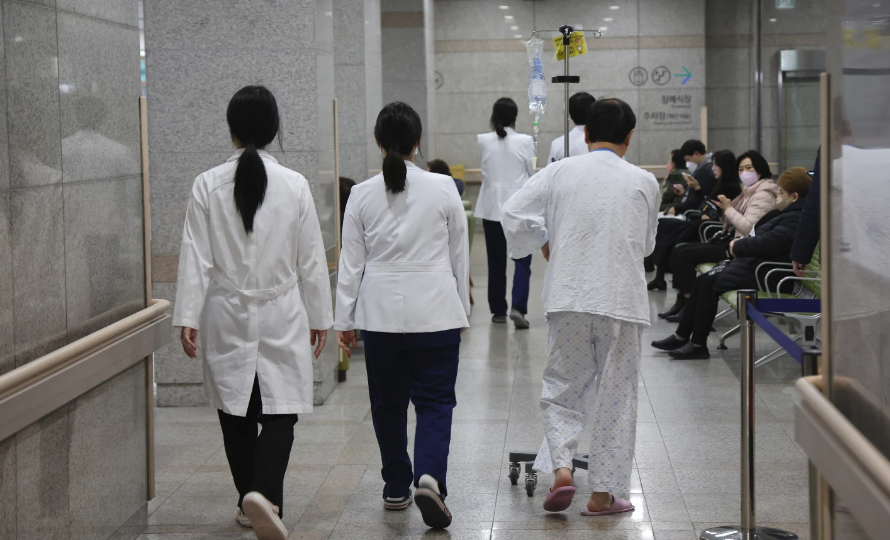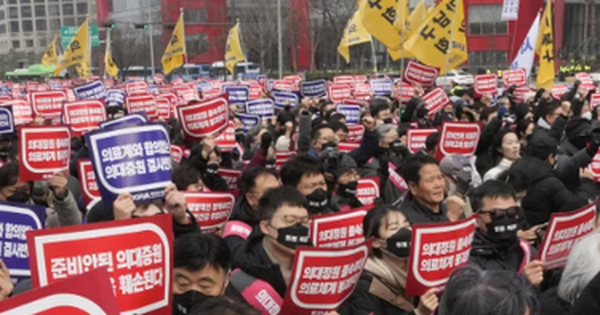South Korea Begins Suspending Doctors’ Licenses for Strikes
The South Korean government has started suspending professional licenses as punishment for doctors who went on strike in February to protest against the government’s plan to significantly increase medical school admissions.
Increasing Medical School Admissions
The recruitment plan aims to address the rapid aging of South Korea’s population, as the country has one of the lowest doctor-to-population ratios among developed nations. However, doctors argue that the sudden and substantial increase in the number of medical students cannot be effectively managed by the existing educational institutions, which will ultimately weaken the country’s healthcare services.
License Suspension
Starting in early March, the South Korean government began taking steps to suspend the licenses of doctors participating in the strike after they refused to return to work at the end of February. The country’s police are currently investigating five senior members of the Korean Medical Association, the representative body of doctors in South Korea, for allegedly inciting and facilitating the strikes.
One of the association’s members, Park Myung-Ha, received a letter from the government stating that his license would be suspended for three months starting from April 15th. Another high-ranking member, Kim Taek-woo, will also have his professional license suspended for three months.
The South Korean Ministry of Health has declared that it will not confirm any administrative procedures reported to be applied against individual doctors.

Park expressed his anger and frustration with the government’s measures, stating, “I and my fellow doctors are genuinely angry.”
While around 12,000 junior doctors have gone on strike for a month, none of them have had their licenses suspended yet. Observers predict that it will take several months to suspend all their licenses, and ultimately, the government may only suspend the licenses of strike leaders.
The Need for Skilled Doctors
Out of the 140,000 doctors in South Korea, less than 10% are highly skilled young doctors. However, in major hospitals, they make up about 30% to 40% of the supporting doctors during surgeries and the treatment of inpatients.
The strike has resulted in the cancellation or postponement of hundreds of surgeries and other medical procedures. Nonetheless, South Korean officials have assured the public that the overall handling of emergency and critical patients remains stable.
Senior doctors in major university hospitals have recently decided to submit their resignations next week in support of the junior doctors. However, most of them are expected to continue working. If they were to resign, it would put a significant burden on South Korea’s healthcare system.
In a previous briefing on March 18th, Deputy Minister of Health Park Min-soo urged senior doctors to cancel their plans and convince the striking junior doctors to return to work. He stated, “Under no circumstances should you use people’s lives for negotiations.”
Increasing Medical School Admissions
In early February, the South Korean government announced that it would increase the number of medical school admissions by an additional 2,000 spots nationwide, beginning in 2025. This figure has remained unchanged since 2006.
According to the South Korean government, more doctors are needed to address the long-standing shortage of doctors in rural areas and essential specialties that offer lower salaries.
However, doctors argue that newly recruited medical students will also strive to work in the capital region and high-paying fields such as plastic surgery and dermatology. The government’s plan may also lead to unnecessary medical treatments due to increasing competition among doctors.
Most South Korean citizens support the government’s recruitment plan, as surveys have shown. Critics argue that doctors, who have one of the highest-paying professions in South Korea, are concerned about potential income reductions in the future.

